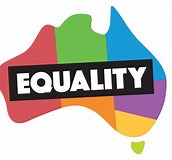From our friends at Equality Australia

| This week we celebrate two years since marriage equality became law in this country. A moment of triumph for our community that was made possible by decades of work and millions of Australians standing up for fairness. But the Prime Minister and Attorney General chose this week, on Human Rights Day, to announce the second draft of their Religious Discrimination Bill. And it’s bad. We’ve only had it on our desk for a few days but wanted to share our first thoughts. Over the coming weeks we will be preparing our analysis, briefing campaign partners, and making sure these changes (and the dangers they bring) are accessible to other people like me who don’t have law degrees. This Bill impacts on everyone, from sporting heroes to everyday Australians who should be able to live, study, work and go to the doctor without facing hurtful religious views. That’s why we’ve teamed up with notable Aussies Ian Thorpe, basketballer Lauren Jackson and author Benjamin Law, to make a video explaining just how bad this Bill really is. You can watch it here . |
There’s
a little bit of good news– The government has realised that its healthcare
clauses went too far. The new Bill has reduced the types of health
practitioners that can take advantage of the conscientious objection in health
care provisions. They still apply to workers most likely to be the first line
of response for people needing care – doctors, nurses, psychologists, midwives,
and pharmacists. It no longer allows these healthcare professionals to refuse
treat to specific people.
But they can still object to certain procedures.
Unfortunately, there’s quite a bit of bad news. The Bill:
- Privileges religious expression over discrimination protections. The Bill removes discrimination protections for LGBTIQ+ people, women, people with disability, and others when people make certain statements which are discriminatory based in religion.
- Entrenches double standards in law. Religious organisations will be allowed to discriminate against others with different beliefs or no belief, even when providing publicly funded services. People will be provided protections when they engage in religious activity that breaches local by-laws which we all have to follow. Corporations associated with religious people will be given discrimination protections, while religious schools will continue to be able to discriminate on the basis of sexuality, gender identity, marital or relationship status, or pregnancy.
- Privileges religious views over patient health needs. Even with the changes, Australians will find it harder to access non-judgmental healthcare, such as sexual health, family planning, fertility, mental health and transgender health services, where ever they live. Professional standards, such as those that require objecting health professionals to refer patients to alternative health professionals who will treat them, may come under challenge. oOo
